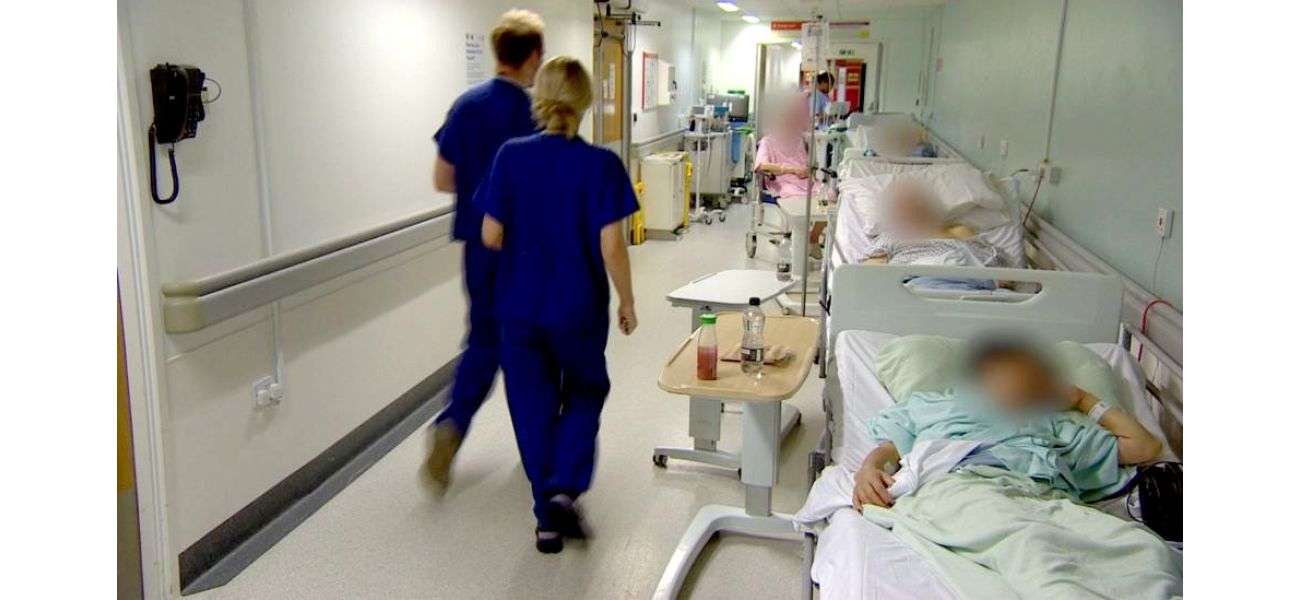Doctors warn that the new hospital corridor for patient care is risky.
Experts warn against making overcrowded corridors the norm for patient care.
December 16th 2024.

Earlier this year, there were reports of patients being treated in the corridors of Queen's Hospital in Romford. This has caused concern among emergency doctors who have criticized the new NHS guidance on how to treat patients in corridors. Some of the UK's leading health professionals have spoken out against this new guide, saying it is dangerous and should not be normalized.
The Royal College of Emergency Medicine has stated that caring for patients in corridors should only be a last resort. However, NHS England has referred to the use of corridors for patients as "temporary escalation spaces." This is a response to the upcoming difficult winter that the NHS is facing. In September, the NHS published guidance on how to provide safe and high-quality care in these temporary spaces. But the experts at RCEM have described this guidance as nonsensical and out of touch.
One of the main concerns raised by RCEM is that providing safe and good quality care is not possible in corridors and cupboards. This type of care can lead to long wait times in emergency departments, compromising the dignity and confidentiality of patients. It is also difficult for patients to get proper rest and sleep in these temporary spaces. Infection control is also a major issue, and it is challenging for staff to monitor patients in corridors. This ultimately leads to delays in treatment and can cause harm to patients.
The College's president, Dr. Adrian Boyle, and vice-president, Dr. Ian Higginson, have also highlighted the distressing experience for patients, especially the elderly and vulnerable, who are left in open, noisy, and brightly lit areas. They emphasize that "corridor care" is a result of overcrowding in hospitals and that efforts should be focused on preventing this rather than finding ways to deal with it.
The challenges facing the NHS this winter are further compounded by the current wave of winter bugs, including flu, RSV, norovirus, and Covid-19. This has been referred to as a "quad-demic," and it is wreaking havoc on the health system. Witnesses have shared their firsthand accounts of loved ones being treated in full view of others in hospital corridors.
Senior midwife Donna Ockenden, who has led reviews into patient safety in the NHS, has expressed her concern that corridor care has become the norm. She recently shared her daughter's experience of receiving emergency treatment in a hospital in October. She described how trolley waits and corridor care have become normalized, with laminated signs on the walls indicating how many trolleys can be accommodated at any given time.
In another incident, a terminally ill woman was forced to sleep on the hospital floor due to a lack of beds. Her husband described it as a horrifying experience. These stories are a result of years of cuts to the NHS under the previous Conservative government. While the recent budget has allocated more funding to the NHS, experts are unsure if it will be enough to make a significant impact on patients.
The latest data shows that hospitals in England are operating near their maximum capacity, with an average of over 96,000 beds being filled each day. This is 94.6% of the total available beds. As the winter approaches, the Labour Health Secretary has ordered health service bosses to prioritize patient safety. The chief executive of NHS England has also stressed that patient safety must be paramount.
In response to the criticism, an NHS England spokesperson has stated that the guidance was developed in collaboration with nurses and clinical leaders. They also clarified that the NHS does not believe that caring for patients in temporary spaces is acceptable and should only be used as a last resort. They attribute the high demand for hospital beds to the upcoming winter, an increase in patients hospitalized with viruses, and the number of beds taken up by patients ready for discharge. The NHS is working hard to provide safe and high-quality care for patients this winter, including utilizing live data, expanding same-day emergency care, and providing more care in the community.
The Royal College of Emergency Medicine has stated that caring for patients in corridors should only be a last resort. However, NHS England has referred to the use of corridors for patients as "temporary escalation spaces." This is a response to the upcoming difficult winter that the NHS is facing. In September, the NHS published guidance on how to provide safe and high-quality care in these temporary spaces. But the experts at RCEM have described this guidance as nonsensical and out of touch.
One of the main concerns raised by RCEM is that providing safe and good quality care is not possible in corridors and cupboards. This type of care can lead to long wait times in emergency departments, compromising the dignity and confidentiality of patients. It is also difficult for patients to get proper rest and sleep in these temporary spaces. Infection control is also a major issue, and it is challenging for staff to monitor patients in corridors. This ultimately leads to delays in treatment and can cause harm to patients.
The College's president, Dr. Adrian Boyle, and vice-president, Dr. Ian Higginson, have also highlighted the distressing experience for patients, especially the elderly and vulnerable, who are left in open, noisy, and brightly lit areas. They emphasize that "corridor care" is a result of overcrowding in hospitals and that efforts should be focused on preventing this rather than finding ways to deal with it.
The challenges facing the NHS this winter are further compounded by the current wave of winter bugs, including flu, RSV, norovirus, and Covid-19. This has been referred to as a "quad-demic," and it is wreaking havoc on the health system. Witnesses have shared their firsthand accounts of loved ones being treated in full view of others in hospital corridors.
Senior midwife Donna Ockenden, who has led reviews into patient safety in the NHS, has expressed her concern that corridor care has become the norm. She recently shared her daughter's experience of receiving emergency treatment in a hospital in October. She described how trolley waits and corridor care have become normalized, with laminated signs on the walls indicating how many trolleys can be accommodated at any given time.
In another incident, a terminally ill woman was forced to sleep on the hospital floor due to a lack of beds. Her husband described it as a horrifying experience. These stories are a result of years of cuts to the NHS under the previous Conservative government. While the recent budget has allocated more funding to the NHS, experts are unsure if it will be enough to make a significant impact on patients.
The latest data shows that hospitals in England are operating near their maximum capacity, with an average of over 96,000 beds being filled each day. This is 94.6% of the total available beds. As the winter approaches, the Labour Health Secretary has ordered health service bosses to prioritize patient safety. The chief executive of NHS England has also stressed that patient safety must be paramount.
In response to the criticism, an NHS England spokesperson has stated that the guidance was developed in collaboration with nurses and clinical leaders. They also clarified that the NHS does not believe that caring for patients in temporary spaces is acceptable and should only be used as a last resort. They attribute the high demand for hospital beds to the upcoming winter, an increase in patients hospitalized with viruses, and the number of beds taken up by patients ready for discharge. The NHS is working hard to provide safe and high-quality care for patients this winter, including utilizing live data, expanding same-day emergency care, and providing more care in the community.
[This article has been trending online recently and has been generated with AI. Your feed is customized.]
[Generative AI is experimental.]
0
0
Submit Comment





